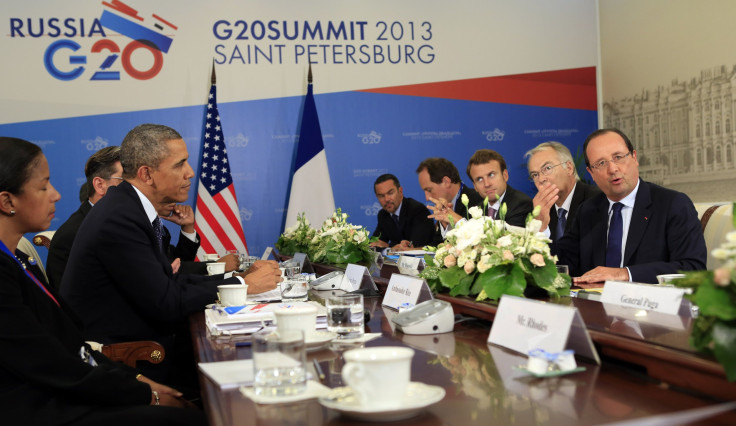U.S. And 10 Others Issue G-20 Statement On Syria Supporting American Action [FULL TEXT]

Eleven of the 20 nations at the G-20 summit in St. Petersburg, Russia, have issued a joint statement on the Syrian situation that calls for a "strong international response" and expresses support for the United Nations Security Council, but notes that it "remains paralyzed as it has been for two and a half years" since the Syrian civil war began.
Therefore, the statement's signatory nations said, they "support efforts undertaken by the United States and other countries to reinforce the prohibition on the use of chemical weapons."
Along with the United States, the other 10 nations are Australia, Canada, France, the U.K., Italy, Japan, Saudi Arabia, South Korea, Spain and Turkey.
Russia and China are not among the governments that signed the statement. Neither are the Latin American members of the G-20, Brazil, Argentina and Mexico; India; or Germany.
The full text of the statement is below.
--
The Leaders and Representatives of Australia, Canada, France, Italy, Japan, Republic of Korea, Saudi Arabia, Spain, Turkey, the United Kingdom and the United States of America made the following statement on the margins of the Group of 20 Nations Leaders' Meeting in Saint Petersburg, Russia:
The international norm against the use of chemical weapons is longstanding and universal. The use of chemical weapons anywhere diminishes the security of people everywhere. Left unchallenged, it increases the risk of further use and proliferation of these weapons.
We condemn in the strongest terms the horrific chemical weapons attack in the suburbs of Damascus on August 21st that claimed the lives of so many men, women and children. The evidence clearly points to the Syrian government being responsible for the attack, which is part of a pattern of chemical weapons use by the regime.
We call for a strong international response to this grave violation of the world’s rules and conscience that will send a clear message that this kind of atrocity can never be repeated. Those who perpetrated these crimes must be held accountable.
Signatories have consistently supported a strong U.N. Security Council Resolution, given the Security Council's responsibilities to lead the international response, but recognize that the Council remains paralyzed as it has been for two and a half years. The world cannot wait for endless failed processes that can only lead to increased suffering in Syria and regional instability. We support efforts undertaken by the United States and other countries to reinforce the prohibition on the use of chemical weapons.
We commit to supporting longer term international efforts, including through the United Nations, to address the enduring security challenge posed by Syria’s chemical weapons stockpiles. Signatories have also called for the UN fact finding mission to present its results as soon as possible, and for the Security Council to act accordingly.
We condemn in the strongest terms all human rights violations in Syria on all sides. More than 100,000 people have been killed in the conflict, more than 2 million people have become refugees, and approximately 5 million are internally displaced. Recognizing that Syria’s conflict has no military solution, we reaffirm our commitment to seek a peaceful political settlement through full implementation of the 2012 Geneva Communique. We are committed to a political solution which will result in a united, inclusive and democratic Syria.
We have contributed generously to the latest United Nations (UN) and ICRC appeals for humanitarian assistance and will continue to provide support to address the growing humanitarian needs in Syria and their impact on regional countries. We welcome the contributions announced at the meeting of donor countries on the margins of the G-20. We call upon all parties to allow humanitarian actors safe and unhindered access to those in need.
European signatories will continue to engage in promoting a common European position.
© Copyright IBTimes 2024. All rights reserved.





















